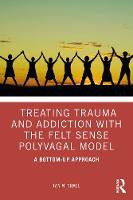Treating Trauma and Addiction with the Felt Sense Polyvagal Model: A Bottom-Up Approach

Book Details
- Publisher : Routledge
- Published : 2021
- Cover : Paperback
- Pages : 218
- Category :
Addictions - Category 2 :
Individual Psychotherapy - Catalogue No : 95687
- ISBN 13 : 9780367408121
- ISBN 10 : 0367408120
Reviews and Endorsements
Reframing addiction and its treatment through the lens of Experiential Psychotherapy, Polyvagal Theory, Interpersonal Neurobiology and Imago Relationship Therapy, Jan Winhall has produced a brilliant synthesis and expansion of addiction theory and treatment that should be read by all therapists, not just addiction specialists." - Harville Hendrix, PhD, and Helen LaKelly Hunt, PhD, authors of Doing Imago Relationship Therapy in the Space Between.
"In this insightful volume Jan Winhall brings together the essence of groundbreaking modern therapeutic practices with her own decades of hard-won clinical experience to fashion a new, deeply humane and promising model of addiction treatment, illustrated by poignant clinical vignettes." - Gabor Mate, MD, is the author of In the Realm of Hungry Ghosts: Close Encounters with Addiction.
"In Treating Trauma and Addiction with the Felt Sense Polyvagal Model Jan Winhall introduces a new strategy to treat addiction that brilliantly integrates Gendlin's classic concept of a felt sense with Polyvagal Theory. The author shares her intellectual journey in which unique insights transform two disparate perspectives into obvious complements leading to a powerful treatment model. As Polyvagal Theory gives the language of neuroscience to Gendlin's felt sense, the phenomenological world of Gendlin becomes transformed by Polyvagal Theory into observable shifts in autonomic state. The product of this creative journey is an integrated therapeutic strategy with the potential to decode the wisdom of the body with its full repertoire of survival reactions into positive outcomes that promote optimal mental and physical health. These successes are highlighted by new abilities to co-regulate with others that lead to successful trusting relationships." - Stephen W. Porges, PhD, Distinguished University Scientist, founding director, Traumatic Stress Research Consortium, Kinsey Institute, Indiana University Bloomington; professor of Psychiatry, University of North Carolina at Chapel Hill.

